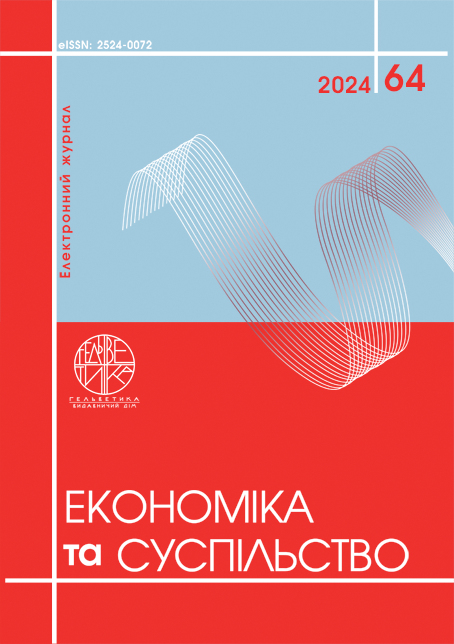THE SIGNIFICANCE OF INTERNAL ENVIRONMENTAL CONTROL FOR AGRIBUSINESS ENTERPRISES
Abstract
Internal control at the enterprise is an important component of its continuous, stable, effective, productive activity. In a general aspect, internal control makes it possible to assess the reliability of data by accounting objects in terms of primary data, consolidated documents, forms of financial, tax and other reporting. The agricultural sector, on par with other industries, is closely related to natural resources and affects the country's food security. Therefore, the ecological component of the agricultural sector should occupy a significant percentage in the overall structure of the evaluation of the enterprise's activity, on a level with economic, financial and social issues. Therefore, challenges of a global nature, which are directly related to environmental problems, should come to the fore. Protection of lands, controlled introduction of mineral fertilizers, use of basic means technically suitable for use in production (with lower emissions of harmful substances into the atmospheric air), conservation of water resources require continuous internal environmental control at the enterprise. Business entities and the state should always be interested in high-quality agricultural products, which are produced for both domestic and foreign sales markets, therefore, a high-quality assessment of natural resources, determination of ways and methods of their restoration, allocation of funds (laying into the country's budget – on macro-level, and the estimate of the enterprise – at the micro-level) to restore the state of the environment, first of all, the most polluted territories in the post-war period. This requires the training of specialists in conducting internal environmental control at the enterprise and constant improvement of their qualifications both in conditions of sustainable development and in conditions of uncertainty. Therefore, developed forms of internal environmental reporting for the management system are recommended to assess the state of the environment. The article defines the main stages of environmental accounting, internal environmental control and analysis of the state of environmental protection objects at the enterprise. Important methodological techniques of internal environmental control by business entities are highlighted.
References
Видатки зведеного бюджету України. URL: https://index.minfin.com.ua/ua/finance/budget/cons/expense/
Небильцова В.М., Остапенко Н.В. Внутрішній екологічний аудит як один із аспектів управлінської діяльності підприємств. URL: https://dspace.nuft.edu.ua/server/api/core/bitstreams/9ab0e463-9b63-4124-b1f6-695f263ae85b/content
Бардаш С.В., Кулаєць М.М. Онтологічна інтерпретація суб’єктної системності екологічного контролю. Проблеми теорії та методології бухгалтерського обліку, контролю і аналізу. 2019. № 2 (43).
Кузьменко О.К. Становлення та форми організації екологічного аудиту на сільськогосподарських підприємствах. Вісник Полтавської державної аграрної академії. 2013. № 1. С. 163–167.
Про екологічний аудит: Закон України від 24.06.2004 р. № 1862-IV. URL: https://zakon.rada.gov.ua/laws/show/1862-15
Буринська О.І. Екологічна складова сталого розвитку аграрного сектора України. Агросвіт. 2016. № 22. С. 48–57. URL: http://www.agrosvit.info/pdf/22_2016/10.pdf
Vidatki zvedenogo biydgetu Ukraini [Expenditures of the consolidated budget of Ukraine]. Retrieved from: https://index.minfin.com.ua/ua/finance/budget/cons/expense/ (in Ukrainian)
Nebiltsova V.M., Ostapenko N.V. (2013). Vnutrishnii ekologichnii audit iyk odin iz aspektiv upravlinskoi dialnosti pidpriemstv [Internal environmental audit as one of the aspects of management activity of enterprises]. Retrieved from: https://dspace.nuft.edu.ua/server/api/core/bitstreams/9ab0e463-9b63-4124-b1f6-695f263ae85b/content (in Ukrainian).
Bardash S.V., Kulaiets M.M. (2019). Ontologichna interpretatsia sub’iektnoi sistemnosti ekologichnogo kontroliy [Ontological interpretation of the subject system of environmental control]. Problemi teorii ta metodologii buhgalterskogo obliku, kontroliy i analizu. № 2 (43). (in Ukrainian).
Kuzmenko O.K. (2013). Stanovltnnia ta formi organizatsii ekologichnogo auditu na silskogospodarskih pidpriemstvah [Formation and forms of environmental audit organization at agricultural enterprises]. Visnik Poltavskoi derzavnoi agrarnoi akademii. № 1. P. 163–167. (in Ukrainian)
Pro ekologichnii audit [About environmental audit]. Law of Ukraine № 1862-IV (2004, June 24). Retrieved from: https://zakon.rada.gov.ua/laws/show/1862-15 (in Ukrainian)
Burinska O.I. (2016). Ekologichna skladova stalogo rozvitku agrarnogo sektora Ukraini [Ecological component of sustainable development of the agricultural sector of Ukraine]. Agrosvit. № 22. P. 48–57. Retrieved from: http://www.agrosvit.info/pdf/22_2016/10.pdf (in Ukrainian)
Copyright (c) 2024 Тамара Гуренко, Світлана Дерев’янко

This work is licensed under a Creative Commons Attribution 4.0 International License.


